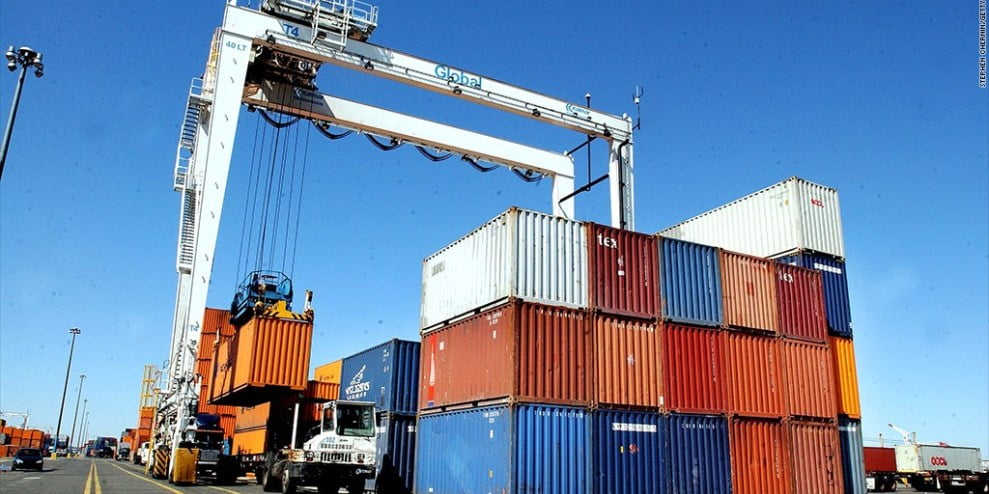The challenges hitherto experienced by Importers and exporters at the nation’s ports and borders may soon become a thing of the past as the National Agency for Food and Drug Administration and Control NAFDAC and the Global Alliance for Trade Facilitation GATF have commenced putting together strategies aimed at achieving standardization and harmonization of documents for export and import trade with a view to simplifying trade formalities and procedures and ultimately ensuring ease of doing business in Nigeria.
This was disclosed by the Director General of NAFDAC, Prof. Mojisola Adeyeye at a virtual meeting with the Global Alliance for Trade Facilitation, Nigeria top officials led by its Project Lead, Mr. Bernard Traynor.
Join our WhatsApp ChannelThe project is being powered by the Global Alliance for Trade Facilitation. It’s an organization that is being hosted by the Centre for International Private Enterprise, International Chambers of Commerce, and the World Economic Forum. The project in Nigeria is being implemented by the German Technical Cooperation popularly known as GIZ. The alliance is supported by the governments of US, Canada, Germany, Denmark and government of Australia through their respective agencies.
In a statement by NAFDAC Resident Media Consultant, Sayo Akintola on Sunday, June 6, 2021, Prof Adeyeye who was represented by Dr Abimbola Adegboye, Head of Trade and International Relations at the Agency reiterated measures that NAFDAC has already put in place to ensure that there’s a seamless and more robust operational procedure with both export and import at the borders; and achieve cooperation amongst government agencies at the borders.
She said NAFDAC’s focus now is to ensure smooth trade facilitation and regulation, stressing that operations of regulators should not pose an hinderance to trade transactions but facilitate them. ’’We are focused on making sure that there are not so many interferences between the users of our facilities and ourselves. So, we try as much as possible to remove both human interferences under the guise of consultants. Because more or less they do not facilitate trade. They tend to distort it’’.
According to Prof. Adeyeye, trade should be on basis of safety and quality, noting that, that is the only way trade could be sustained. ‘’If quality is not put into your product, It gives the country a bad name. They blacklist the company involved. The consumers are the losers because they do not have value for money and their health is compromised’’.
She noted that these are the issues that the global alliance is trying to address, adding that ‘’what will make all these visible and possible is to ensure that operations at the borders are seamless.
If you have perishable items that are to be exported or that are to be allowed into the country and they are delayed unnecessarily, and they are not held at premium conditions such products could go bad, and quality and the integrity of such product would be compromised leading to health issues with the end-users.
Anything that would make trade operations very easy both for inflow and outflow, that would make the whole process of regulation friendly, we are all for it’’.
In other not to make the whole process too cumbersome for exporters and importers, she stated that for ease of doing business the agency has ensured that all NAFDAC import licenses consisting of approvals, import and export permits have been made in electronic format which can be verified on the NAFDAC single window for trade portal. ‘’The import of this is that there is no need for any scanned documents when an importer needs to process form ‘M’.’’
In his submission, the Project Manager of Global Alliance for Trade Facilitation, Nigeria. Mr. David Okeku, the title for the project is Standardization and Harmonization of Trade formalities and procedures in Nigeria. He disclosed that his organization is being powered by the Centre for International Private Enterprise, International Chambers of Commerce, and the World Economic Forum.
He further explained that the project in Nigeria is being implemented by the German Technical Cooperation popularly known as GIZ and supported by the governments of US, Canada, Germany, Denmark and government of Australia through their respective agencies.
‘’Being an alliance, we also have critical private sector partners,. which we work with: BLM, BSM, DHL, Mascline, UPS and WALMART. On a global scale, we have series of projects which we are currently implementing in Kenya, Madagascar, Malawi, Zambia, Senegal, Uganda and Latin America, Asia and middle East countries’’.
‘’How we work in the alliance is that we partner with multinationals, local businesses because we believe strongly that they will bring in their expertise and also best practices; and also bring in supply-chain companies. We use them as our ambassadors globally and in-country. Local businesses also contribute in form of expertise and resources in kind towards the alliance’’
In Nigeria, he said the on-going project, Harmonization and Simplifying Trade Formalities and Procedures in Nigeria, seeks to support implementing three articles of the World Trade Organization (WTO) Trade Facilitation Agreement. ‘’This speaks to article 10.1 which borders around formalities and documentary requirements, article 8 which talks about border agencies cooperation and article 2.2 which talks on consultation.’’
According to him, the aim of the project is to simplify, standardize and harmonize export and import formalities and trade procedures in Nigeria, adding that it also aims at reducing the average release time and the associated costs, its documentary requirements and border compliance for exports and imports.
He further explained that the scope of the project is capacity building for border agencies, e.g., NAFDAC, Customs, SON, Quarantine, and other agencies on the ground. ‘We are also working clearly on defining export data, documents and processes for the Nigeria Customs service, and other partner agencies.
For now, he said the project is focusing on the Cargo operations in Lagos, after which ‘’we would then take the lessons learnt and scale it up to Sea cargo operations subsequently’’.
‘’Our partners on the ground are the Nigeria Customs Service, FMITI and border agencies like NAFDAC, SON, NDLEA, FAAN while on the side of the private sector, we have the International Chamber of Commerce, Nigeria, MAN, LCCI, the Association of Nigeria Licensed Customs Agents, the Nigeria Private sector alliance, and the Organization for Women in Internal Trade. Private sector companies like DHL, UPS, MARZK are our partners on the ground’’, he said.
Mr. Okeku said his organization had conducted a gender study to identify gender specific bottlenecks on air cargo trade, adding that ‘’We also worked out or defined mainstreaming approaches and series of targeted actives which are currently being incorporated into our work plan’’.
‘’In February we realized a memorandum of understanding with the Nigeria Customs as a lead agency for border operations in Nigeria. We had series of capacity buildings for the customs service with trade facilitation related topics. Last month we had an executive master class for the management of the
Nigeria Customs Service on trade facilitation agreement issues in Nigeria’’.
Going forward, he said a policy steering group at the headquarters level which will be chaired by the Federal Ministry of Trade and Investment and the NCS would be set up with a similar group at the operational level on the ground at the Lagos Airport.
He said a baseline assessment at the Lagos airport would be conducted and agreed with stakeholders on target model and workplan. For the policy steering group and operational steering group, ‘’we would need a representation at the headquarters level that would be giving the management direct feedback’’, adding that the policy steering group would cut across all other agencies and private sector key partners. ‘’It would be in form of high-level group in Abuja for policy and decision-making purposes’’.
For the operational purposes in Lagos, he said there would be the operational group consisting of the clearing agents on the ground. ‘’NAFDAC’s representative at the Airport with the key IT division would be representing NAFDAC at the Airport committee level.’’
‘’We are having these two approaches for the purpose of fast-tracking our work and for ease of flow of information between the agencies. It’s also a way of enforcing inter-agency cooperation and collaboration both at the high level in Abuja and on the ground in Lagos’’, he said, stressing that ‘’We strongly believe that this approach will help us in implementing our projects and ultimately help Nigeria achieve the three articles which we are looking at in helping Nigeria implement in Lagos.’’
















This is a comprehensive report, very informative.
We hope this inter-agency project will yield the desired result of reducing bottlenecks in Nigeria’s import and export trade system, and fastrack clearing and forwarding of goods at the ports, while ensuring that best quality goods are imported and exported.